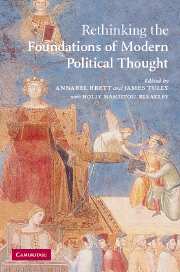Book contents
- Frontmatter
- Contents
- List of contributors
- Preface
- Part I Introduction
- Part II Rethinking the foundations
- 3 Foundations and moments
- 4 Skinner, pre-humanist rhetorical culture and Machiavelli
- 5 Unoriginal authors: how to do things with texts in the Renaissance
- 6 ‘The Best State of the Commonwealth’: Thomas More and Quentin Skinner
- 7 Scholasticism in Quentin Skinner's Foundations
- 8 Scholastic political thought and the modern concept of the state
- 9 ‘So meerly humane’: theories of resistance in early-modern Europe
- 10 Hobbes and democracy
- 11 A lion in the house: Hobbes and democracy
- 12 Hobbes and the foundations of modern international thought
- 13 Surveying The Foundations: a retrospect and reassessment
- Bibliography
- Index
12 - Hobbes and the foundations of modern international thought
Published online by Cambridge University Press: 19 February 2010
- Frontmatter
- Contents
- List of contributors
- Preface
- Part I Introduction
- Part II Rethinking the foundations
- 3 Foundations and moments
- 4 Skinner, pre-humanist rhetorical culture and Machiavelli
- 5 Unoriginal authors: how to do things with texts in the Renaissance
- 6 ‘The Best State of the Commonwealth’: Thomas More and Quentin Skinner
- 7 Scholasticism in Quentin Skinner's Foundations
- 8 Scholastic political thought and the modern concept of the state
- 9 ‘So meerly humane’: theories of resistance in early-modern Europe
- 10 Hobbes and democracy
- 11 A lion in the house: Hobbes and democracy
- 12 Hobbes and the foundations of modern international thought
- 13 Surveying The Foundations: a retrospect and reassessment
- Bibliography
- Index
Summary
Profecto utrumque verè dictum est, Homo homini Deus, & Homo homini Lupus. Illud si concives inter se; Hoc, si civitates comparemus.
(Hobbes, De Cive)Quentin Skinner concluded The Foundations of Modern Political Thought (1978) with the claim that ‘[b]y the beginning of the seventeenth century, the concept of the State – its nature, its powers, its right to command obedience – had come to be regarded as the most important object of analysis in European political thought’. For confirmation of this, he quoted Thomas Hobbes who, in the preface to De Cive (1642), declared that ‘the aim of “civil science” is “to make a more curious search into the rights of states and duties of subjects”’. Foundations was dedicated to the historical examination of just how the state became the central analytical object of political thought and how the groundwork for a recognisably modern concept of the state had been laid. Fundamental to this concept was the state's independence from ‘any external or superior power’. Yet, save for a brief but suggestive account of neo-scholastic conceptions of the law of nations, Foundations included no treatment of the state in its nature, its powers or its rights as an international actor. The concept of the state traced by Skinner defined it almost entirely in terms of its internal, domestic or municipal capacities. The relations between states had apparently not yet become an important object of political or historical analysis.
The absence from Foundations of any extended treatment of what might be called the foundations of modern international thought was typical for the time at which the book appeared.
- Type
- Chapter
- Information
- Rethinking The Foundations of Modern Political Thought , pp. 219 - 235Publisher: Cambridge University PressPrint publication year: 2006
- 16
- Cited by

